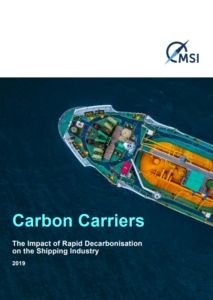The decarbonisation of global energy supplies to mitigate climate change will have significant implications for the global shipping industry. If the Paris Agreement goals are met, the fossil fuel cargo base that shipping serves would experience an aggressive and prolonged transformation, according to a report from Maritime Strategies International (MSI).
The results for shipping markets of a major shift in energy consumption away from hydrocarbons and towards renewables and biofuels is the subject of a report prepared by MSI on behalf of the European Climate Foundation (ECF).
MSI’s shipping market modelling systems analyzes how changes in energy demand will impact inter-regional commodity trade flows, and the related shift in the necessary shipping capacity, industry earnings and asset prices, across all sectors of the shipping industry.
The analysis projects two demand frameworks – ‘Reduction’ and ‘Reference’ – designed to provide broad narrative and structure to long-term global energy demand.
[smlsubform prepend=”GET THE SAFETY4SEA IN YOUR INBOX!” showname=false emailtxt=”” emailholder=”Enter your email address” showsubmit=true submittxt=”Submit” jsthanks=false thankyou=”Thank you for subscribing to our mailing list”]
Global energy consumption in the Reduction scenario is largely based on projections made for pathways consistent with limiting warming to 1.5°C above pre-industrial levels, as described in the IPCC SR1.5 report. The Reference scenario provided a comparison to Reduction. Although it describes a more limited change in the global energy consumption profile, Reference still includes important restraints on future energy consumption.
The report focuses on the more extreme Reduction scenario, according to which fossil fuel demand sees radical reduction over the next three decades. By 2050, global coal consumption decreases by 80%, oil consumption halves, and gas demand drops by around a quarter.
While some sectors of the shipping industry, such as container ships, would be virtually unscathed, those for which hydrocarbons account for a significant proportion of the cargo mix would undergo decades of falling demand.
The results would be multi-decade falls in fleet capacity, earnings and asset prices across the affected sectors. Ship owners would also be forced to cut new ordering and scrap uneconomic ships.
What is more, MSI says that the energy transition from fossil fuels to renewables means that investors in shipping and ports are exposed to substantial financial risks, which have not been adequately assessed before.
Accelerated action at a governmental level, technological advances, increased renewable use, public pressure, and rising regulatory and financial constraints will all play a role to this process, but it is not know how fast they will do it.
Finally, in a quick transition, as explored in this report, vessel selection will be crucial, and divestment from sectors with the greatest exposure to fossil fuels may prove the only way to profitably navigate the changing landscape.
See more information in the PDF herebelow
































































